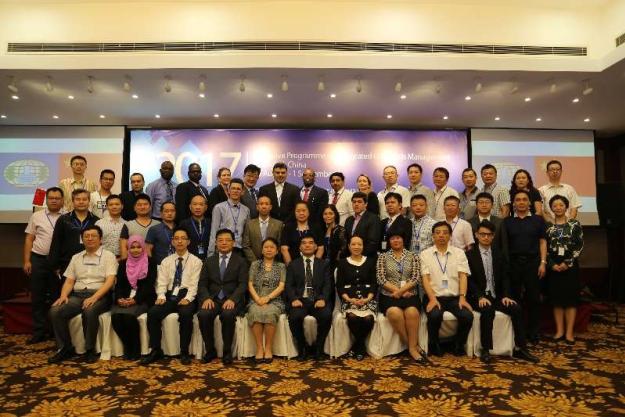
Participants from the Executive Programme on Integrated Chemicals Management, which was held in Shanghai, China from 29 August – 1 September 2017.
THE HAGUE, Netherlands – 11 September 2017 – Executives from 16 countries enhanced their skills in sustainable management of chemicals at an Executive Programme on Integrated Chemicals Management in Shanghai, China from 29 August – 1 September 2017.
The programme, organised by the Organisation for the Prohibition of Chemical Weapons (OPCW) in collaboration with National Authority of China, explored ways of a more holistic approach to policy, industrial management, science and engineering for safe, secure and sustainable management of chemicals.
The Deputy Director-General of National Chemical Weapons Convention (CWC) Implementation Office in China, Ms Zhang Wei, underlined the significance of this programme, held in the year marking the 20th anniversary of the CWC and OPCW. She expressed the hope that the programme “will contribute to the sustainable development of chemical industry for the benefit of mankind, as China attaches great importance to the sharing of experience on the peaceful uses of chemistry and stands ready to deepen international cooperation on the implementation of CWC.’’
OPCW’s Head of International Cooperation Branch, Mrs Xiaohui Wu, emphasised the importance of bringing all stakeholders together for the implementation of CWC’s Article XI, and creating a responsible culture of integrated chemicals management.
The programme included panel discussions on a wide range of topics including: the implementation of the Chemical Weapons Convention, international cooperation on integrated chemicals management, latest trend and challenges in integrated chemicals management, coping with and anticipating changes in the global market through integrated chemicals management, opportunities and challenges of sustainable development in chemistry education, and integration of chemicals management culture in laboratories.
The participants also paid a visit to Sinopec Shanghai Petrochemical Company Limited to see the practical application of integrated chemicals management in modern chemical industry setting.
The programme welcomed more than 40 participants from Bangladesh, Belarus, Brazil, China, Korea, Malaysia, Myanmar, Nigeria, Saudi Arabia, Serbia, Thailand, Uganda, United Kingdom, United States of America, Vietnam and Zambia, who contributed their rich managerial experiences from government agencies, chemical industries, academia and laboratories.
Background
As the implementing body for the Chemical Weapons Convention, the OPCW oversees the global endeavour to permanently eliminate chemical weapons. Since the Convention’s entry into force in 1997 – with its 192 States Parties – it is the most successful disarmament treaty eliminating an entire class of weapons of mass destruction.
Ninety-six per cent of all chemical weapon stockpiles declared by possessor States have been destroyed under OPCW verification. For its extensive efforts in eliminating chemical weapons, the OPCW received the 2013 Nobel Prize for Peace.
